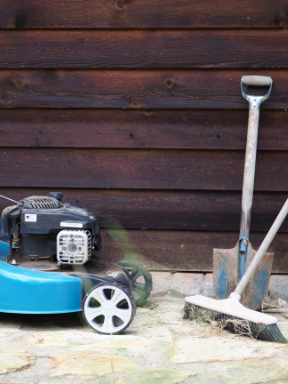
Winterize Your Lawn Equipment
And just like that! Winter is right around the corner, and kids will be playing in the snow before we know it. It is time to pull out that snowblower and get her started up! But before that, let’s talk about the best ways to winterize your lawn equipment. This includes your lawnmower, weed whacker, leaf blowers, edgers, shears, and other handy tools you have used over the summer and spring. Here at Clark’s Landscape, we preach that end-of-season maintenance helps to extend the life of your expensive equipment and tools. We’ve come up with a couple of rules that will help make your life easier and your tools last longer when you winterize your lawn equipment.
Winterize Your Lawnmower
We all know that we have used our lawnmowers over and over again, making them the most used lawn equipment. A properly maintained and well-kept lawn mower can last you between eight and ten years, maybe even longer! When you notice the first frost hits late fall is the perfect time to inspect, clean, maintain, and winterize your lawnmower. In other words, the perfect time is now. The next big question is, how exactly do you winterize your lawnmower? Let’s go over that.
Drain or Stabilize the Fuel
After you have finished your final cut of the year, run your mower until your gas tank is dry. Leftover fuel will cause clogs, corrosion, frozen lines, and other issues. If you happen to just fill up your tank and don’t want to waste the fuel, you can use a fuel stabilizer. The fuel stabilizer, when combined with the gas, will keep the gas fresh until the spring. You can find this at almost all hardware and home stores. Once the stabilizer is combined with your gas, make sure to run the engine for at least five minutes to ensure the stabilizer reaches the carburetor.
Inspect the Blades
First things first, make sure you disconnect your spark plug wire, then carefully remove the blades from the lawnmower. Second, check blades for any cracks or noticeable wear. To prevent any less-than-pleasant situations next spring, replace any damaged blades. Lastly, you’ll want to sharpen the blades by removing equal amounts of metal from each side.
Clean the Deck
Keeping the deck clean helps to ensure maximum performance throughout the season. Before winter you’ll want to clean the desk so moisture doesn’t become trapped inside which will cause rust or erosion. To efficiently clean the desk, scape with a brush or putty knife. This will make sure the majority of grass clippings are removed. Once you are done brushing and scraping, you’ll want to rinse with water.
Drain and Replace Oil
Just like your gas, you do not want to allow the oil to sit in your lawnmower over winter. It contains moisture and acids that could cause damage to your engine parts. Therefore, before putting it away for the winter, you want to drain and replace the oil for springtime.
To do this:
- Run the engine to become warm to heat up the pol, which will help expel more of the dirty oil and other contaminants.
- Replace with new oil

Clean or Replace Air Filter
Make sure to clean and inspect the air filter in your lawnmower. If your engine uses a specific filter, replace it with a new one. If you have a foam filter it can be cleaned with soap and water. Damaged or dirty filters should be replaced.
Inspect Internal Parts
Go through and inspect all parts of the lawnmower. You’ll want to ensure spark plugs and belts are working properly and not damaged. Tighten any belts that are loose and replace any that look cracked or worn.
Winterize Garden Equipment
Because lawn and tree diseases spread through other contaminated equipment, it is important to clean and disinfect all other tools that you use for your lawn. The best way to do this is to make it a part of your winterization process. Cleaning off soil, sap, and grass clippings will help your tools last longer and run more efficiently.
To Disinfect
Combine one tablespoon of dish detergent with a gallon bucket of warm water and use a scrubbing brush to clean your blades. When cleaned, rinse them off. Next, you will need to disinfect to ensure all other remnants of insects or diseases are thoroughly gone. For this, household disinfectants such as isopropyl alcohol and chlorine bleach can be used.
Dry Off & Store Them
Once you have completed cleaning your tools, dry them off to prevent them from rusting. Use steel wool or emery cloth to rub off any new rust spots.
If you are looking for help with your lawn care needs, feel free to reach out to Clark’s Landscaping team. We offer full-service landscaping services that we’d be happy to help you with.
